Mouth Cancer Action Day - Blue Wednesday - 16th November 2022
The Oral Health Foundation have been raising awareness of mouth cancer for 21 years in the UK. The charity is concerned at the rates of mouth cancer now currently being seen in the UK, and has embarked on a publicity drive around the need for the public to monitor the condition of their mouths in an aim to ensure healthy mouths and early diagnosis of the disease. Over 2,300 people in the UK die annually from mouth cancer, with over 7,000 cases of this form of cancer being diagnosed annually in the UK.
Large and regular intake of alcohol, and even using mouth wash containing alcohol, can be a cause of mouth cancer. In addition smoking is a greater risk, along with the Human Papilloma Virus (HPV) which is in itself increasing amongst the population. Age is no limit to the risk of developing mouth cancer as it hits both the old and the young.
Mouth cancer in the United Kingdom has risen to a record high, according to the findings of a new report from the charity. Figures for last year show that 8,864 people in the UK were diagnosed with the disease last year. This has increased by 34% compared to 10 years ago and has more than doubled (103%) within the last generation.
The state of NHS dentistry has declined too with majority of people unable to find dental practices that provide NHS services. So along with the bad state of the nation's teeth, goes a decline in the health of the nation's mouths.
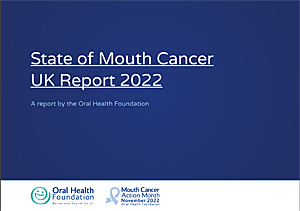 A summary of the key findings
A summary of the key findings
- New cases of mouth cancer in the UK reached 8,846 last year.
- This has increased by 34% in the last decade and by 103% compared with 20 years' ago.
- 58% of mouth cancers appear on the tongue and tonsils.
- Last year, 3,034 people in the UK lost their life to mouth cancer.
- The ten-year survival rate is between 18% and 57%, depending on where the cancer strikes and how early it is diagnosed.
- Almost nine-in-ten (88%) UK adults have now heard of mouth cancer. However, awareness on the signs, symptoms and risk factors is poor.
- Awareness of the major signs and symptoms for mouth cancer are as low as 17%.
- Awareness on the major risk factors of mouth cancer is as low as 9%.
- Improving access to NHS dentistry, tackling late diagnosis, and protecting public health policies are some of the key challenges in confronting mouth cancer.
- The report calls for for more funding for NHS dentistry, investment in education and the need to boost uptake of the HPV vaccination.
Click on the photo above right to download the report or go to the Unionsafety E-Library to search for this and other documents on the issue of Cancer.
The Oral Health Foundation website provides further details of the disease of mouth cancer:
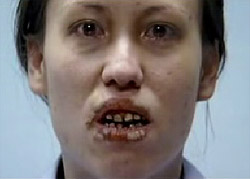 What is mouth cancer?
What is mouth cancer?
Most people have heard of cancer affecting parts of the body such as the lungs or breasts. However, cancer can appear in the mouth, where the disease can affect the lips, tongue, cheeks and throat.
Who can be affected by mouth cancer?
Anyone can be affected by mouth cancer, whether they have their own teeth or not. Mouth cancers are more common in people over 40, particularly men. However, research has shown that mouth cancer is becoming more common in younger patients and in women. There are more than 640,000 cases of mouth cancer diagnosed each year worldwide and it is the eleventh most common cancer. In the United States there are around 43,000 cases each year.
In some countries there is an increased risk because of problems such as tobacco chewing - in India, for example - and the rates are even higher. There are, on average, almost 7,800 new cases of mouth cancer diagnosed in the UK each year. The number of new cases of mouth cancer is on the increase, and in the UK has increased by over half in the last decade alone.
Do people die from mouth cancer?
Yes. More than 2,300 people in the UK die from mouth cancer every year. Many of these deaths could be prevented if the cancer was diagnosed early enough. As it is, people with mouth cancer are more likely to die than those having cervical cancer or melanoma skin cancer.
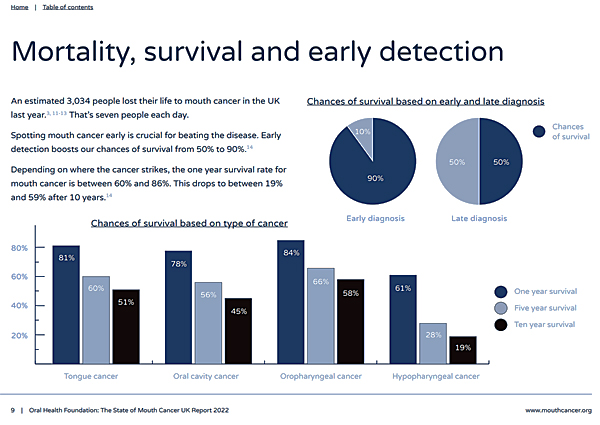
What can cause mouth cancer?
Most cases of mouth cancer are linked to tobacco and alcohol. Cigarette, cigar and pipe smoking are the main forms of tobacco use in many parts of the world. However, the traditional habits in some cultures of chewing tobacco, betel quid, gutkha and paan are particularly dangerous.
Alcohol increases the risk of mouth cancer, and if tobacco and alcohol are taken together the risk is even greater.
Over-exposure to sunlight can also increase the risk of cancer of the lips.
Many recent reports have linked mouth cancer to the human papillomavirus (HPV). HPV is the main cause of cervical cancer and affects the skin that lines the moist areas of the body.
HPV can be spread through oral sex, and research now suggests that HPV could soon rival smoking and drinking as one of the main causes of mouth cancer.
Practicing safe sex and limiting the number of partners you have may help reduce your chances of getting HPV. Many people get HPV during their lives and for many this does not cause a problem.
What are the signs of mouth cancer?
Mouth cancer can appear in different forms and can affect all parts of the mouth, tongue and lips. Mouth cancer can appear as a painless mouth ulcer that does not heal normally. A white or red patch in the mouth can also develop into a cancer. Be aware of any unusual lumps in your mouth or jaw area and any persistent hoarseness. It is important to visit your dental team or doctor if these areas do not heal within three weeks. If you aren't sure, go for a check-up anyway.
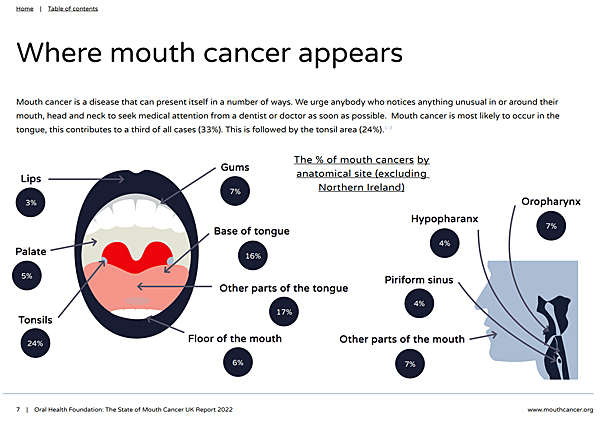
How can mouth cancer be detected early?
Mouth cancer can often be spotted in its early stages by your dental team during a thorough mouth examination. If mouth cancer is diagnosed early, then the chances of a cure are good. Many people with mouth cancer go to their dentist or doctor too late.
Is there anything I can do at home?
Be aware of what is going on in your mouth. Examine yourself regularly. Ulcers that do not heal within three weeks, any unusual red or white patches, lumps in your neck or jaw area, or persistent hoarseness are all reasons for asking your dental team or doctor to examine you. There is probably nothing seriously wrong but an early diagnosis could save your life.
What is involved in a full check-up of the mouth?
The inside of your mouth and your tongue will be examined with the help of a small mirror. The examination will also look at your neck and underneath your jaw. Dentists will carry out this examination as part of a routine dental check-up. Remember, your dental team can see parts of your mouth that you cannot see easily yourself.
It is estimated that 1 in 3 people do not check their mouths on a regular basis and those having regular dental checks are decreasing as a result of the serious decline in NHS dentistry.
Blue Wednesday is designed to inform and educate the public around self-checks that people need to do in order to spot the early signs of Mouth Cancer. In 2022, Blue Wednesday takes place on November 16th and we are asking you to share one very simple message….
A self check for mouth cancer takes 45 seconds and can save your life.
For Blue Wednesday we want to encourage as many people as possible to check their mouth for the early warning signs of mouth cancer.
Help us get more people regularly checking themselves for mouth cancer because early diagnosis is vital for beating the disease.
Spotting mouth cancer early can significantly change a person’s quality of life.
You can take part in Blue Wednesday by sharing information about how to conduct a self-check at home.
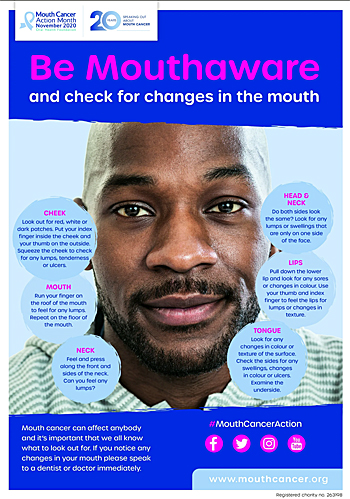 You can do this by sending patient’s newsletter and emails or on social media. The information you should include:
You can do this by sending patient’s newsletter and emails or on social media. The information you should include:
What to look for:
- Long lasting mouth ulcers
- Red or white patches
- Unusual lumps and swelling
Where to check
- Roof and floor of the mouth
- Inside of the cheeks
- Gums
- Tonsils
- Tongue
- Lips
- Head and neck
Who to contact if anything out of the ordinary is noticed:
A 45 second check could save your life. Learn the signs of mouth cancer, such as unusual lumps, red or white patches and ulcers, to catch it early.
Union Safety Reps wishing to highlight the need for everyone to regularly self-check their mouths can find a number of resources available from the Oral Health Foundation to aid their local campaigns.
The new report by the charity is now available and can be downloaded from the Unionsafety E-Library by clicking on the reports cover image at the top of this news item.
Source: Oral Health Foundation / The Independent / Unionsafety



 What is mouth cancer?
What is mouth cancer?

 You can do this by sending patient’s newsletter and emails or on social media. The information you should include:
You can do this by sending patient’s newsletter and emails or on social media. The information you should include: